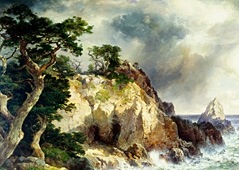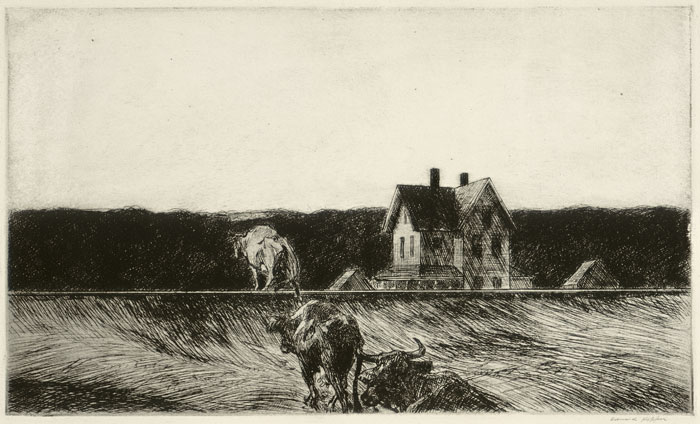

Doubt and duality of place | A sense of loss | Thematic | Conclusion | Sources
Authors: Irving | Oates | Oates about Herman Melville's "Moby Dick."
A. Expressing doubt in writing.
Sleepy Hollow as sensing a place: along the river in upstate New York.1
Excerpts from the story and the entire story is at: The Legend of Sleepy Hollow
- History
- diplomacy, he had lived in Europe for several years.
- The American Minister to Spain (President Tyler 1841-46.) and
- Irving was a Whig political supporter meaning he was more liberal representing commercial interests in New York and opposing President Jackson.
- uses of satire
- The narrative
- Setting––A riverside village on the verge of the Enlightenment –
- Characters––Ichabod, Abraham, Katrina & Baltus Van Tassel,
- Story-line––Van Tassels, estates, & revealing Village superstitions,
- Climax – immediate events leading to crossing the bridge.
- Dénouement – an explanation that leaves us in doubt.
Doubt and duality of place | A sense of loss | Thematic | Conclusion | Sources
![]()
B. Capturing a sense of unrecoverable loss in writing.
Joyce Carol Oates, Against Nature.
"Nature as in Thoreau's upbeat Transcendentalist mode ( 'the indescribable innocence and beneficence of Nature,––such health, such cheer, they afford forever! and such sympathy have they ever with our race, that all Nature would be affected … if any man should ever for a just cause grieve.' ), and not in Thoreau's grim mode ( 'Nature is hard to be overcome but she must be overcome')."
Oates, Against Nature; Anthology. page 844, line 25.
For the entire essay go to– http://2010yeagleyenglish.pbworks.com/f/Against%2BNature%2Bby%2BOates019.pdf
See: Joyce Carol Oate's "Homepage" on the web.
http://web65.rollins.edu/~jsiry/Visual Learning.html - question
A far deeper question's answer is revealed here.
Discovering the complexity of motive when writing: Joyce Carol Oates,
"Another way of saying, not Nature-in-itself but Nature-as-experience."
p. 844, line 25 +.
"Nature that pleases us because it mirrors our souls, or gives the comforting illusion of doing so.
There is a dualism in her argument. The climax of which restates and reveals her artfully convoluted point.
![]()
"I had a waking dream of uncanny lucidity:
My body is a tall column of light and heat.
My body is not 'I' but 'it.'
My body is not one but many.
My body, which 'I' inhabit, is launched as well by other creatures, unknown to me, imperceptible–the smallest of them mere sparks of light."
"...the most astonishing secret is that the 'I' doesn't exist! – but it behaves as if it does, as if it were one and not many."
"The 'I' which doesn't exist, is everything."
Of her twenty six or more examples of the compound-complex theme of "resistance precedes existence,"
Oates takes us with five key points from experience, to reflection and back:
1.) dualism or using two often opposing means of envisioning the same thing to create depth. Thoreau versus Dr. Samuel Johnson's two framing quotes mirrors her dualistic portrayal of these three themes:
A. the personal experience and the rationalization based on literary authority
B. Both the rhetorical and the abstraction convey meanings
C. Interior is exterior or exterior invades the interior (nature)2.) Assertion: nature writing is artful storytelling
3.) counter assertion: a reaffirmation of the "illusion," "hallucination," "error," "mirror, " ego escape," "accepting place," "tolerable means."
4.) Formal Argument : writing as a necessary dualistic format, yet an insufficient way to express the mute world of which we are both subject & object simultaneously.
5.) to conclude: we impose because we have to, we have no other means to compose.
6.) Moral She cautions us: beware literature can tell us something more about our own biased views, as opposed to human circumstances in the conditions of existence, only if we are a clever reader.
Therefore: nature is no mere representation of the external world or an artist's rendition of the photographically engaging but ultimate manifestants of inexpressible forces to which we cope by telling stories.
Who is this author?
The Apopka wiki: here is an example of the ultimate need for Joyce Carol Oates approach to nature writing in Against Nature.
![]()
Washington Irving was an avid supporter of civil rights for American Indians, rare for his era. He is buried in Sleepy Hollow, in the Hudson River Valley.
Edward Hopper, American Landscape, 1920; etching on paper, National Gallery of Art, Washington, Print Purchase Fund (Rosenwald Collection) and Ailsa Mellon Bruce Fund, 1979
Joyce Carol Oates, an American Author, critic, novelist, playwright, writer, & Princeton U. professor..
Oate's Interview with the New York Times Sept 9, 2012:
"What engages me is the mysterious, indefinable music of a writer’s voice. I first read Henry David Thoreau’s “Walden” when I was 15 years old, and if I’d been told that it was a young man’s autobiographical novel, I would not have been surprised."
…. "The sparely, scrupulously crafted early short stories of Ernest Hemingway about the young Nick Adams might well be “nonfiction” — of surpassing beauty. If the reader wants information primarily, of course nonfiction is preferred. But what is executed by way of “information” makes literature, whether fiction, nonfiction or poetry"
"Our great American tragic-epic, Moby Dick ."
Elements in this epic that suggest to Oate's its importance for Americans today are:
- a " Ship of State" named for a Native American Indian (tribal) peoples, Pequod,
- a multicultural or diverse crew of men and a boy,
- a restless yet observant narrator / survivor, despite a Puritanical Yankee Captain,
- set in a sea where Melville's expert fiction was informed –quite literally– by actual facts.
![]()
Doubt and duality of place | A sense of loss | Thematic | Conclusion | Sources

